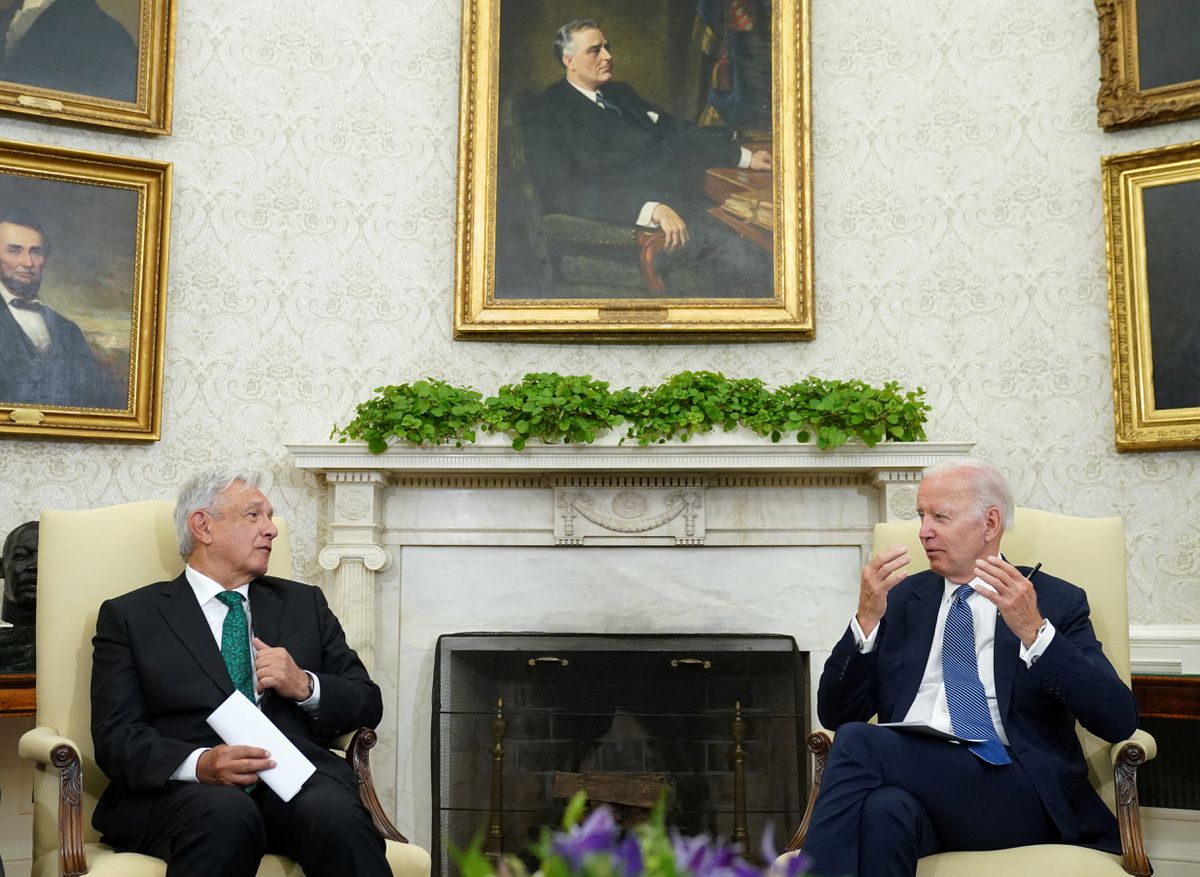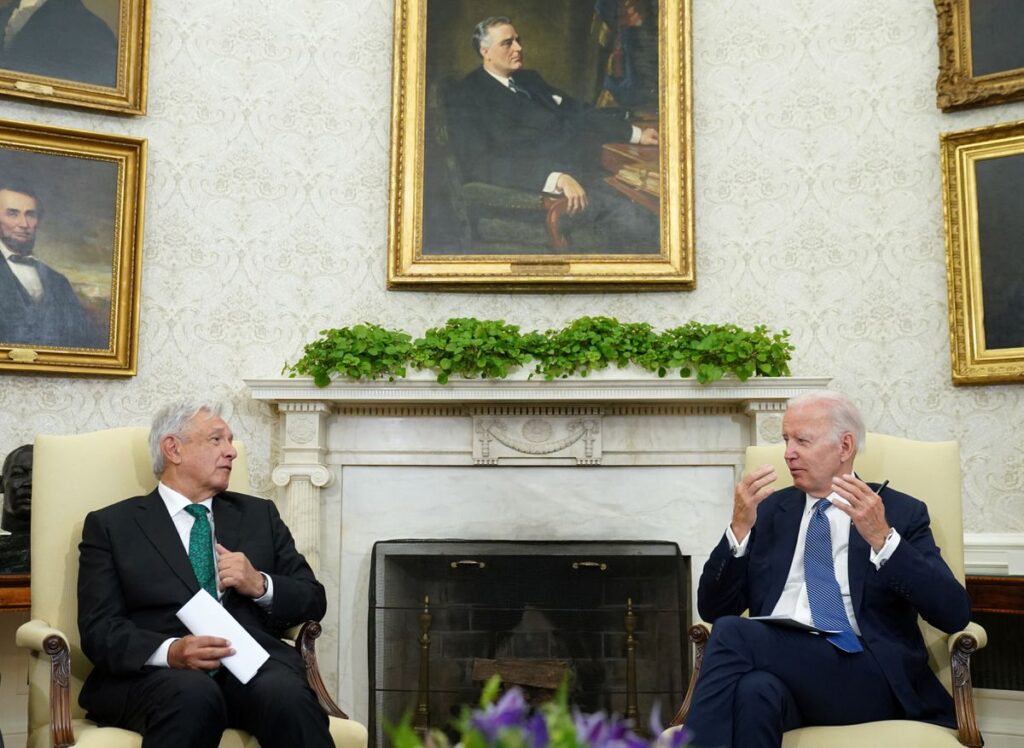
At the North American Summit, the United States and Mexico are set to discuss a range of issues that will shape the future of the two countries.
Immigration, drug trafficking, and the implementation of the United States-Mexico-Canada Agreement (USMCA) are all on the agenda. The USMCA, which was signed in 2018, is a trade agreement that seeks to increase economic interdependence between the three countries, but many argue carries over the same structural flaws associated with NAFTA.
Canada, which is also a part of the USMCA, will be looking to manage two bilateral relationships with the United States and Mexico focusing on Energy and mining rights, which has not been acknowledged in the stream of pro-US interest articles.
Canada’s Greedy PM Wants Mexico’s Energy Sector
Prime Minister Justin Trudeau of Canada said on Tuesday that he understood the desire of President Andrés Manuel López Obrador of Mexico to put more emphasis on state-owned energy companies, but warned that it must be done in a way that respects the rules of the United States-Mexico-Canada Agreement (USMCA).
The USMCA, which replaced the North American Free Trade Agreement, includes a provision known as investor-state dispute settlement (ISDS) that allows companies to sue governments if they feel their investments have been unfairly treated. In Mexico’s case, the majority of investors have sought to resolve disputes this way.
Additionally, USMCA also includes provisions from the Comprehensive and Progressive Agreement for Trans-Pacific Partnership (CPTPP), which allows companies to challenge government policies that they believe are unfair. “I understand he wants to put more of an emphasis on the state-owned energy companies,” Trudeau said. “But it has to be done in a responsible way, in a way that understands that he’s a part of USMCA and he has to abide by those rules.”
Many outlets have failed to highlight the good associated with Mexico’s controlled energy policy. Mexico is leading the way in the energy revolution, with a nationalized oil and gas industry that is providing tangible benefits to its citizens and the state.
This is in stark contrast to the United States and Canada, where the energy industry is largely controlled by wealthy billionaires and corporations. Instead, the Mexican government has taken a proactive approach to energy policy, investing heavily in renewable energy sources such as solar and wind.
This has resulted in a dramatic reduction in the country’s reliance on fossil fuels, and has helped to reduce the country’s carbon footprint. When placed alongside a series of transportation projects that connect Mexico’s tourism industry to rail (as opposed to inefficient bus routes), Mexico’s energy policy is an attempt at modernization in its own terms.
The benefits of this policy are clear. By nationalizing the energy industry, the Mexican government is able to ensure that the profits from the industry are reinvested in the country, rather than being siphoned off to the usual US and Canada based wealthy individuals and corporations.
This has resulted in a more equitable distribution of wealth, and has allowed the government to invest in infrastructure and social programs that benefit the entire population, like the subsidy available to millions of youth living below Mexico’s poverty line.
Furthermore, Mexico is better positioned to control an industry that is presently destroying the planet. This is a stark contrast to the United States and Canada, where the energy industry is largely controlled by wealthy individuals and corporations, and where the environmental consequences of their actions are largely ignored. Mexico’s proactive approach to energy policy is a model for the rest of the world. It is a model that the United States and Canada should strive to emulate instead of trying to change.
Drugs – Democrats Want To Tout Bilateralism
Former Virginia Governor Tim Kaine praised the arrest of Mexican drug lord, Joaquín “El Chapo” Guzmán, on Twitter, citing the importance of disrupting the flow of fentanyl into the United States. Kaine, who is now a U.S. Senator, said that the arrest was “crucial” to combat the trafficking of fentanyl, a powerful synthetic opioid that has caused a surge in overdose deaths in Virginia and across the country.
Kaine’s comments come after President Joe Biden and Mexican President Andrés Manuel López Obrador announced a joint task force in July to combat the trafficking of fentanyl and other drugs. Biden arrived to Mexico on Air Force One late Sunday and was greeted by Andres Manuel Lopez Obrador along with members of his cabinet.
“Fentanyl is a major public health crisis that has taken too many lives in Virginia and across the country,” Kaine said in a statement. “The arrest of El Chapo is a major step forward in our fight against the opioid epidemic and I’m hopeful that it will help disrupt the flow of fentanyl into our communities.”
The summit is expected to focus on the issue of drug trafficking, particularly the trafficking of fentanyl, a powerful opioid that has caused a public health crisis in the United States. Much of the homeless population throughout the United States is comorbid for mental health and substance abuse. Please see prior coverage.
Already, Mexican president Andres Manuel Lopez Obrador and President Joe Biden have discussed these points in a past AMLO visit to Washington D.C.

The summit is also expected to discuss the implementation of the USMCA, including the energy sector. The North American Summit is an important opportunity for the United States and Mexico to come together and discuss the issues that will shape the future of the two countries, but many are weary of a US centric approach that often leaves Mexicans with the short end of the technological and economic stick.
For instance, technology development and subsidy for advanced chips will be solicited by the AMLO administration in exchange for permitting the private participation of American business in Mexico’s sensitive energy sector.
Canada, the cold, snowy nation north of the United States, follows the lead of it’s southern neighbor for policy, with oil and natural gas







